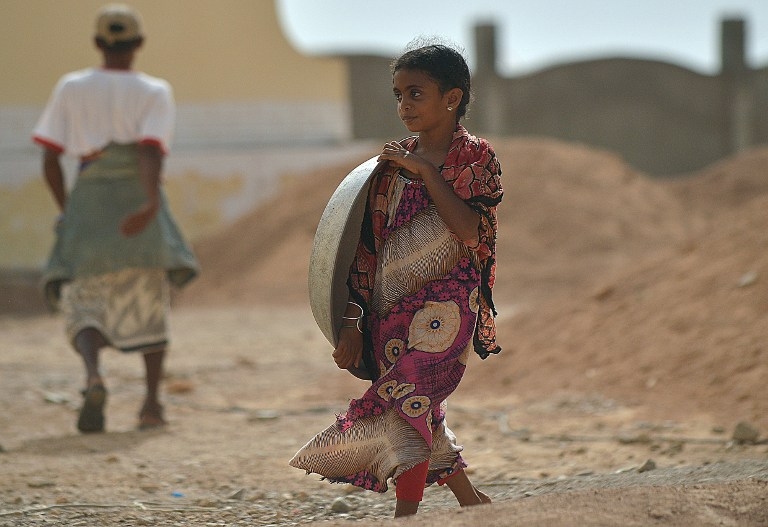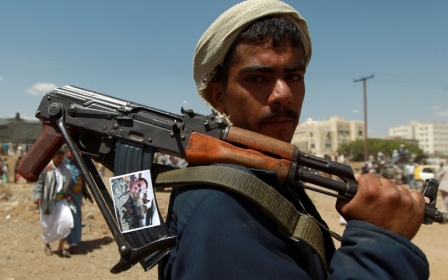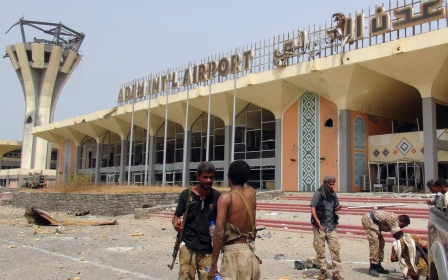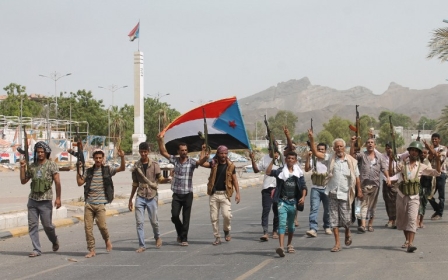For Yemen’s migrants, troubles don’t end at the Saudi border

For three months Mohammed al-Anesi had put up with the coalition bombings in Sanaa - with his windows rumbling at all hours, his young children weeping in fear, and death threats from militants - until one day in May, he decided it was time to go. The pressures of war were unbearable, not just for him, but for his young family too.
Fraught with worry, and fears his children would become targets, he fled early one morning via Haradh to Saudi Arabia. “When the extremists [al-Qaeda, Houthis] started threatening me about my kids, that’s when I started to worry,” Anesi said.
From the travel agencies in Sanaa, he bought tickets for Saudi Arabia and left with his family of four. With an increasing number of Yemenis desperate to flee, the price of bus tickets has skyrocketed by 80 percent to 10,000 riyals ($50).
“People were so desperate. They were willing to pay anything to get out,” he said.
The night before, he and his family had huddled on the floor of their basement, not far from the presidential palace. “Many times I thought we would be next. It was like waiting for death.”
A journey into the unknown
Anesi’s story is no different from the thousands of Yemeni refugees trying to escape their harsh circumstances. By embarking on this journey into the unknown, from Sanaa to Jeddah, many endure a 36-hour road journey, innumerable checkpoints, fear of being kidnapped as well as the actual anxiety and uncertainty of making it through to the border.
At the time of writing, more than 53,000 have fled from Yemen to the neighbouring countries of Oman, Saudi Arabia, Sudan, Ethiopia and Somalia, according to the UN refugee agency UNHCR. Of the total number, roughly 1,500 have travelled via the Haradh border to Saudi Arabia.
According to Rafaat al-Sabbagh, spokesperson for the King Salman Centre for Humanitarian Relief, the borders of Haradh and Tuval closed a month ago because of Houthi shelling. “This was not safe for Saudi Arabia,” he said. However, al-Wadhea border, which is used for commercial purposes, remains open.
Exact numbers of Yemenis detained at the border are unknown. In May, King Salman bin Abdulaziz Al Saud issued a directive to grant 400,000 illegal Yemeni expatriates six-month visit visas that could be further extended on receipt of travel documents from their country’s legitimate government. The UNHCR report stated as of 20 July, 354,863 Yemeni nationals were able to regularise their status. This would give previously stranded Yemenis an opportunity to remain in the kingdom and work legally.
On arrival at Haradh, the Saudi Ministry issues a 10-day permit that grants Yemenis with a third-country visa a chance to plan the next leg of their travel. However, there is no guarantee for Yemeni nationals keen to cross into Saudi Arabia with incomplete documents. Anesi said 80 percent of the people on the bus, including himself, didn’t have a visa.
“First we were rejected and told to return,” he said.
Anesi showed his family's US visas and after much deliberation his family was free to go. He had applied for visas for his family in January to take his children on a summer holiday. At the time of applying, he had no idea he would use the visas under such circumstances.
But, he added, “Many families were turned away.” Some people without Saudi visas or adjoining documents were sent back, he said.
Dire conditions
Refugees, including women and children, endure dire conditions on both sides of the border. There is little opportunity to eat or drink on the journey, and no access to decent lavatories. Instead they are faced with travelling vast, desolate stretches of land in 40-degree heat.
Lemis Wadi*, who endured a similar journey, said, “The checkpoints convinced me this was the Saudis’ way of making the experience unbearable to the point no Yemeni would want to attempt this journey.”
In total, from Sanaa to Jeddah, Anesi counted approximately eight checkpoints. “Every time the bus stopped, my son started crying. Even a six-year-old could sense the tension.” At the border, Anesi said the Houthi officials demanded money. “While Yemenis were charged 100 Saudi riyals ($26), Syrians had to pay 400 Saudi riyals ($104).”
At different points, migrants were ordered to descend from the bus and open their luggage for inspection by both Houthi officials and Saudis. This contributed to a staggering delay in travel times. The journey, which is five hours to the border and 12 hours to Jeddah, took more than two days, Anesi said.
Aggressive border guards
Wadi found the experience not only dehumanising, but unnecessarily aggressive. “Women at passport control would slam the documents on the counter aggressively and clap hands while shouting at the next person, in an attempt to display authority. I saw the security women physically abuse women if they weren’t quick. Many were elderly.”
After comparing both sides of the borders, she said there was a lot of waiting at the Yemeni border but it was faster than the Saudi side. “They [the Saudis] clearly did not want any Yemenis there, and this influx was a huge burden to them.”
After two days on the road, Wadi’s patience was waning, but her options were few. “My body ached with fatigue and I began to imagine I was in a dream. I didn’t know where I was. At times, I wished I was back at home in Yemen. There I felt like a human being.”
At the same time Wadi said she remembers seeing refugees stranded at the borders for days.
Harassment and extortion
In June, videos of Saudi officials harassing Yemenis emerged on social media. But, Charlotte Ridung, assistant representative at UNHCR, said she was unable to comment on the veracity of content due to the lack of UN presence at the border.
Apart from the tortuous journey, migrants are susceptible to other risks. In the UNHCR report, issued July 2015, the International Organisation for Migration (IOM) reported that an extortion racket is on the rise. Taking advantage of the power vacuum, traffickers and armed groups kidnap vulnerable migrants on their way to Saudi Arabia and hold them for ransom. The sums could range anywhere between $600-$1,000. The report said those unable to pay are subject to beatings and torture.
Anesi argued: “Saudi harassment is not as bad as the Houthis at the border. They are not angels, but they are doing their job of protecting their country. A majority of Yemenis don’t have documents. Some of them try to evade the law. When they get caught, they are punished, beaten, detained.”
That being said, he added, “It’s not correct to beat anybody, it’s a complete lack of human rights.”
Before the refugees switch from one compound to another (Haradh to Tuval) they are left waiting for 10 hours before Saudi officials take them in. Anesi was taken in at 8am, despite arriving earlier that morning. “When we went inside, the first thing we had to do was get a vaccination. I don’t know what it’s for.” Everyone is forced to take the vaccination, regardless of whether they qualify to cross over into Saudi territory."
Wadi recalled: “There was complimentary food at the Saudi border as if to say sorry you had to flee in terror, hopefully this free cup of noodles will make it all better. The people who worked at the border spoke condescendingly to everyone. I would not speak to my dog like that.”
Despite the hostility and resentment, Anesi was able to get a short glimpse of the other side. While living in Jeddah for five days, he said Saudis expressed solidarity towards his family.
“‘Yemenis are our extended brothers.’ This is what they said to me.”
Hopeless situation
“I cannot go home, it’s far too dangerous,” said Anesi. “I got a death threat from an al-Qaeda member saying he will sever my head.”
At present Anesi is living off his savings, but he fears the money will run out soon. He is worried about his ill mother who was forced to stay behind because of lack of documentation. He continued, “The situation is hopeless.”
Even after Aden's recapture from the Houthis last week by Southern Resistance fighters, he feels the country has a long way to go.
The Houthis are fighting to reclaim Aden, but Anesi’s concerns are bigger. “Right now al-Qaeda is spreading in the south like [a] tumour. We get rid of Houthis and al-Qaeda has come in. Yemen is going to be in deep problems.”
Meanwhile, Wadi finds it challenging to move on with her life as violence intensifies in other parts of the country.
“Once you get a taste of what everyone in Yemen is going through and the fact that people have it a lot worse than I did, it’s hard to ignore. I have been out for two months and I still get nightmares, but at least when I wake up, they don’t continue.”
*Names in this article have been changed
Middle East Eye propose une couverture et une analyse indépendantes et incomparables du Moyen-Orient, de l’Afrique du Nord et d’autres régions du monde. Pour en savoir plus sur la reprise de ce contenu et les frais qui s’appliquent, veuillez remplir ce formulaire [en anglais]. Pour en savoir plus sur MEE, cliquez ici [en anglais].




